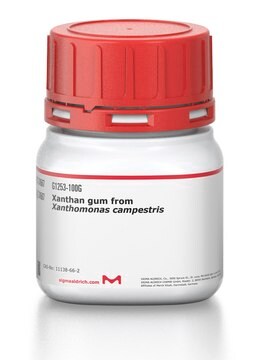W213101
Benzoic acid
≥99.5%, FCC, FG
Sinónimos:
Benzene carboxylic acid, Benzene formic acid, Diacylic acid, Phenylcarboxylic acid
About This Item
Halal
Kosher
Productos recomendados
biological source
synthetic
Quality Level
grade
FG
Halal
Kosher
agency
meets purity specifications of JECFA
reg. compliance
EU Regulation 1334/2008 & 178/2002
FCC
FDA 21 CFR 117
FDA 21 CFR 184.1021
vapor density
4.21 (vs air)
vapor pressure
10 mmHg ( 132 °C)
assay
≥99.5%
form
powder or crystals
autoignition temp.
1061 °F
packaging
poly drum of 10, 25 kg
poly bottle of 1 kg
bp
132-133 °C/10 mmHg
249 °C (lit.)
mp
121-125 °C (lit.)
solubility
soluble, clear, colorless (95% ethanol, 1gm/3mL)
density
1.32 g/cm3 at 20 °C
cation traces
As: ≤3 ppm
Cd: ≤1 ppm
Hg: ≤1 ppm
Pb: ≤2 ppm
application(s)
flavors and fragrances
documentation
see Safety & Documentation for available documents
food allergen
no known allergens
organoleptic
balsam
SMILES string
OC(=O)c1ccccc1
InChI
1S/C7H6O2/c8-7(9)6-4-2-1-3-5-6/h1-5H,(H,8,9)
InChI key
WPYMKLBDIGXBTP-UHFFFAOYSA-N
¿Está buscando productos similares? Visita Guía de comparación de productos
Categorías relacionadas
General description
Application
- Photochemical Aerobic Upcycling of Polystyrene Plastics.: Benzoic acid is utilized in a novel photocatalytic process for the upcycling of polystyrene plastics. This study showcases its application in sustainable chemistry, focusing on the efficient breakdown and recycling of polymer materials (Skolia et al., 2024).
Disclaimer
signalword
Danger
hcodes
Hazard Classifications
Eye Dam. 1 - Skin Irrit. 2 - STOT RE 1 Inhalation
target_organs
Lungs
Storage Class
6.1C - Combustible acute toxic Cat.3 / toxic compounds or compounds which causing chronic effects
wgk_germany
WGK 1
flash_point_f
Not applicable
flash_point_c
Not applicable
ppe
dust mask type N95 (US), Eyeshields, Faceshields, Gloves
Elija entre una de las versiones más recientes:
¿Ya tiene este producto?
Encuentre la documentación para los productos que ha comprado recientemente en la Biblioteca de documentos.
Los clientes también vieron
Global Trade Item Number
| Número de referencia del producto (SKU) | GTIN |
|---|---|
| W213101-1KG-K | 4061835565184 |
| W213101-SAMPLE | |
| W213101-10KG | |
| W213101-10KG-K | 4061837502651 |
| W213101-1KG | |
| W213101-25KG | |
| W213101-25KG-K | 4061834403708 |
| W213101-SAMPLE-K | 4061834354918 |
Nuestro equipo de científicos tiene experiencia en todas las áreas de investigación: Ciencias de la vida, Ciencia de los materiales, Síntesis química, Cromatografía, Analítica y muchas otras.
Póngase en contacto con el Servicio técnico








